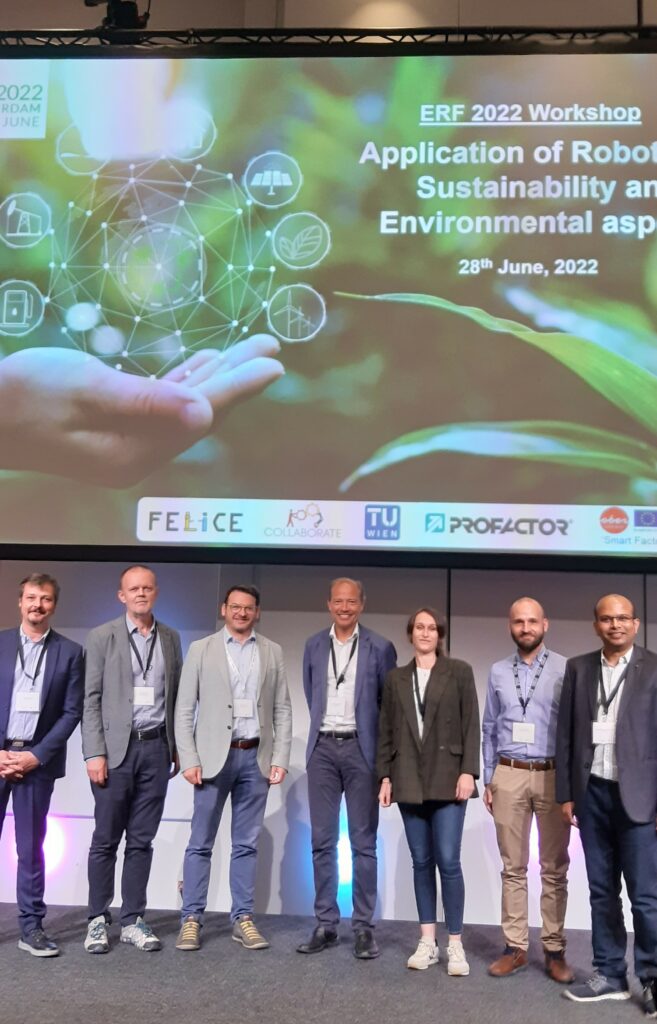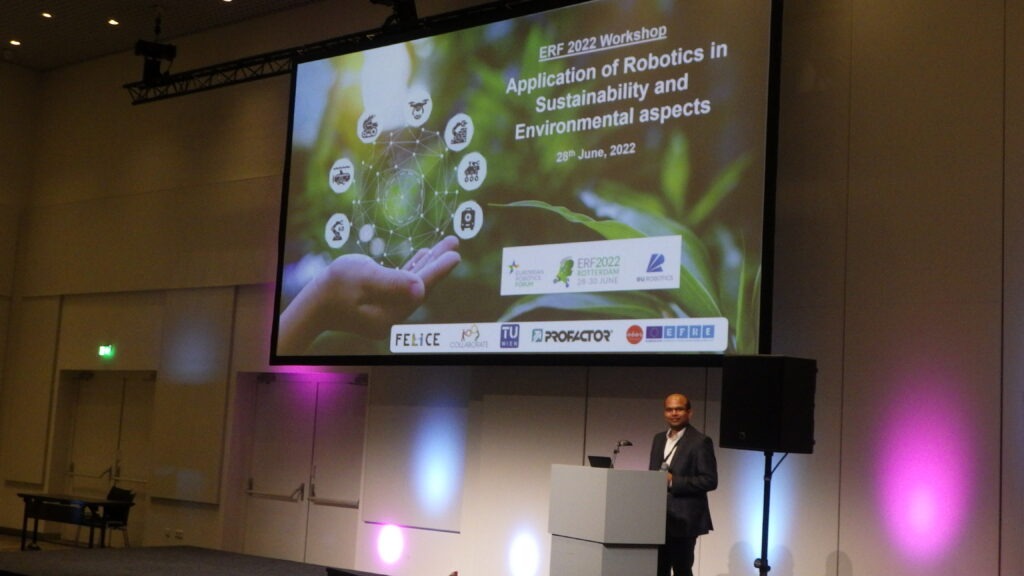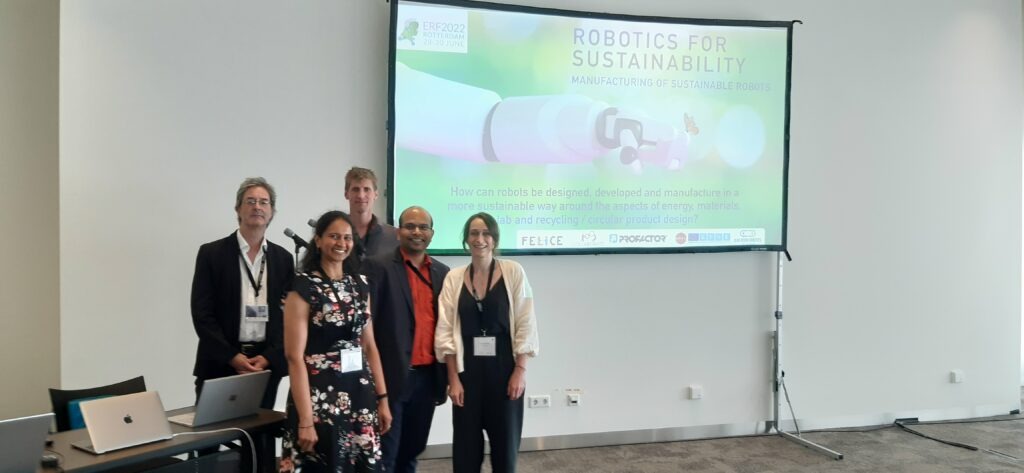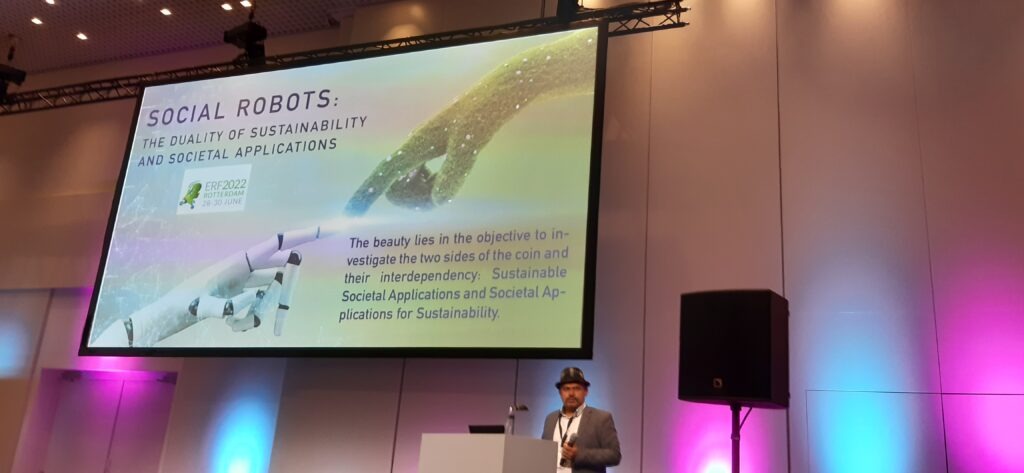ERF2022 Workshops
The workshops are co-organized with the H2020 project FELICE. In conjunction with the European Robotics Forum 2022, 28th – 30th June 2022, Rotterdam, The Netherlands.
More information: https://erf2022.eu/programme/
| Date and Time | Workshop Name |
| June 28th at 14:20, Room 2 @ ERF 2022 | Sustainability Track: Application of Robotics in Sustainability and Environmental aspects |
| June 28th at 16:10, Room 2 @ ERF 2022 | Sustainability Track: Industrial Robots and Sustainability |
| June 29th at 09:50, Room 2 @ ERF 2022 | Sustainability Track: Social Robots: The Duality of Sustainability and Societal Applications |
| June 30th at 08:30, Room 3 @ ERF 2022 | Sustainability Track: Robotics for Sustainability – Manufacturing of Sustainable Robots |


ERF2022 Workshop on Application of Robotics in Sustainability and Environmental aspects
In conjunction with the European Robotics Forum 2022, at Tuesday 28th of June 2022 – 14:20 to 15:40, Rotterdam, the Netherlands.
AIM and Scope:
Are robotics really able to solve the challenges related to sustainability? Are robots the solution or a problem on their own to sustainability? Come join us in our workshop as we gather experts from academia and industry to discuss the aspects of robotics and their role in sustainability and the environment. The focus of the workshop is on the application of robotics in sustainability and as a first step, define sustainable and environmental aspects in different sectors (manufacturing, agriculture, marine, energy, …) and clarify the role of robotic applications in solving those challenges. This is followed by some ongoing applications and case studies where robotic applications have successfully progressed in creating a difference.
The workshop tackles the following:
1. Which challenges can be solved (in principle) by robots when sustainability is concerned. Is robotics a solution or a problem?
2. Different application areas where Robotics help sustainability – HRC for sustainability
3. Present TG on Robotics for sustainability, a draft road map, and next steps.
Expected Outcome:
Trigger information exchange between academia and industry about the current challenges and possible solutions for sustainable production with the application of robots.
A position paper on the results of the workshop and share it, e.g., with the respective topic group/s. This will also form a basis for the newly formed TG Group “Robotics for Sustainability and Environmental Aspects”.
Invited Speakers:
- Damien Salle, Tecnalia
- Sotiris Makris, LMS
- Jesus Pablo Gonzalez Villodres, EURECAT
- Christian Eitzinger, Profactor GmbH
- Javier Sanchez Cubillo, ZeniaLabs Automation Intelligence S.L.,
Organizers of the workshop:
- Sharath Chandra Akkaladevi, Profactor GmbH (https://at.linkedin.com/in/sharathakkaladevi)
- Dr. Maria Pateraki, National Technical University of Athens, Institute of Computer Science – FORTH (http://www.mpateraki.org)
- Franziska Kirstein, Blue Ocean Robotics (linkedin.com/in/fkirstein)
- Ao.Univ.Prof. Dipl.-Ing. Dr.techn. Markus Vincze (http://www.acin.tuwien.ac.at/institut/mvincze/)

ERF2022 Workshop on Industrial Robots and Sustainability
The workshop is held on the 28th of June at 16:10 CET during the ERF 2022, see ERF 2022 Programme for more details
This workshop is conducted within the Sustainability Topic Group and the Industrial Robotics Topic Group of EURobotics
AIM and Scope
A large and growing number of manufacturers are realizing substantial financial and environmental benefits from sustainable business practices. Robotics have traditionally played a vital role in mass production for manufacturing industries, focusing on topics such as precision, payload capacity, sensing capabilities and recently, increased use of connectivity, data and AI. Many roboticists are wondering therefore, how can the topic of sustainability be addressed through robotics. Which new applications and deployment models should be devised to improve sustainability in production? These may require new approaches to the design of robots, robot-using systems and IT systems that employ methods of robotics and AI. Robotics for sustainable development is an exciting challenge where research and industry in both developed and developing countries can equally contribute and benefit.
This workshop focuses on how companies can work in a more sustainable way with the help of industrial and collaborative robots. It will explore attendees’ attitudes towards the 17 Sustainable Development Goals (SDGs), how they contribute to the SDGs and the challenges they have met or anticipate on their journey towards a more sustainable way of working.
In the workshop, we aim to discuss the following topics with the audience:
1. Previous experience towards working with the SDGs: Are audience members considering SDGs in their project work? If yes, can they give examples of targets, goals, activities or processes that they have initiated?
2. Why is it important to contribute to the SDGs and work in a more sustainable way? Is it because it brings financial and economic benefits to the company/organization, because regulations require them to work in a more sustainable way or because it is in their belief to contribute to a better world.
3. Challenges in working towards sustainability and the SDGs. How is it possible to balance the interactions of the SDGs, are there situations where they conflict or reinforce each other? Are carbon pricing, costs of energy, etc. started to become a concern? What factors are considered when introducing Industrial robots to support sustainability? Have costs, carbon footprint of robots, etc. been a concern so far?
Expected Outcome:
Trigger information exchange between research and industry about the current challenges and possible solutions for sustainable business practises and role of robotics. A position paper on the results of the workshop and share it, e.g., with the respective topic group/s. This will also form as a basis for the newly formed TG Group “Robotics for Sustainability and Environmental Aspects”
Invited Speakers
- Introduction to the workshop – José Saenz, Mathias Brandstötter
- General overview of Sustainability and the new Topic Group – Franziska Kirstein, Sharath Chandra Akkaledevi
- “Sustainabilty – an industry perspective“ – Harald Sehrschön – FILL GmbH
- “Disassembly and Re-use of valuable materials: Experiences and challenges, José Saenz, Fraunhofer IFF
Organizers:
- Mathias Brandstötter, Joanneum Research
- José Saenz, Fraunhofer IFF
- Sharath Chandra Akkaladevi, Profactor GmbH
ERF2022 Workshop on Robotics for Sustainability – Manufacturing of Sustainable Robots
The workshop is held on the 30th of June at 08:30 CET during the ERF 2022, see ERF 2022 Programme for more details
This workshop is conducted within the Sustainability Topic Group and the Analytical Laboratory Robotics Topic Group of EURobotics
AIM and Scope
The use of robotics is increasing around the world and soon every household might have at least one robot in use. Robots can support sustainability across all sectors e.g., fighting climate change, helping to recycle, decreasing waste in manufacturing, reducing the use of chemicals in farming, etc. However, the manufacturing of robots themselves can outbalance the positive impact of robotics if not addressed by the robotics community. This workshop focuses on how robots can be manufactured in a more sustainable way around the aspects of energy, materials, lab and recycling/ circular product design. We expect the audience of the workshop to come from industry (especially robot manufacturers) as well as academia (both from robotics, manufacturing or sustainable production).
The workshop aims to discuss the following topics:
1. Results from workshop “Sustainability and Industrial Robots”, where the audience will be asked about their attitudes towards the SDGs, how they contribute to the SDGs and the challenges they have met or anticipate on their journey towards a more sustainable way of working.
2. Knowledge exchange around attempts for a more sustainable manufacturing of robots: What attempts have been made to manufacture robots in a more sustainable way: where and how to start? What are the experiences and outcomes of this? What are the low-hanging fruits in this journey and where are the real challenges?
3. Inspirational exchange on new innovations to push for more sustainable manufacturing of robots: What are sustainable materials? How can robots be designed in a more sustainable way to facilitate better recycling or a circular design? How can a Life Cycle Assessment help to reduce e.g. CO2 footprint? How should the production set-up look like to e.g. use the right energy at the right time? How can labs contribute to increasing the standard of sustainability in robotics manufacturing and educating robotics companies in their sustainability practices?
Expected Outcome:
Trigger information exchange between academia and industry about the current challenges and possible solutions for sustainable manufacturing of robots. A position paper on the results of the workshop and share it, e.g., with the respective topic group/s. This will also form as a basis for the newly formed TG Group “Robotics for Sustainability and Environmental Aspects”
Invited Speakers:
- Patrick Courtney, tec-connection
- Franziska Kirstein, Blue Ocean Robotics
- Radhika Gudipati, Ocado Technology
- Raj Patey, Mygreenlab
Organizers of the workshop:
- Franziska Kirstein, Blue Ocean Robotics (linkedin.com/in/fkirstein)
- Patrick Courtney, tec-connection
- Sharath Chandra Akkaladevi, Profactor GmbH (https://at.linkedin.com/in/sharathakkaladevi)
- Radhika Gudipati, Ocado Technology

ERF2022 Workshop on Social Robots: The Duality of Sustainability and Societal Applications
The workshop is held on the 29th of June at 09:50 CET during the ERF 2022, see ERF 2022 Programme for more details
This workshop is conducted within the Sustainability TG and the Socially Intelligent Robots and Societal Applications TG of EURobotics
AIM and Scope
With the quest to explore the unexplored, this workshop is a collaborative effort by two TGs: 1. Socially Intelligent Robots & Societal Applications, 2. Sustainability & Environmental Aspects. We aim to establish an important connection of the duality of Social Robots’ Applications and Sustainability. The beauty lies in the objective to investigate the two sides of the coin and their interdependency: Sustainable Societal Applications AND Societal Applications for Sustainability. Social robots still face barriers for long-term real-world sustainable deployment. On the other hand, advancements in Robotics & AI can be part of innovative solutions to various societal needs, e.g. sustainability in personalized healthcare, education, equality, development. The workshop aims to provide a platform to brainstorm, produce a roadmap and create awareness of this duality through stakeholders engagement.
The main ambition of the workshop is to identify and create interest groups, and foster discussion to collect valuable insights and feedback, and also provide opportunities for creating awareness about various efforts, towards the objective identified in the motivation section. Therefore, the agenda is designed to balance the time division necessary to accommodate talks from various stakeholders, create the ground for discussion, open the floor for brainstorming and to collect feedback for roadmapping through audience engagement.
To set the ground, selected experts and panelists (from industry, academics, end users, policy makers) will be invited for short presentations to provide insiders perspectives and position statements. The questions will be provided to the panelists and speakers in advance according to the group and theme they will be involved in. This will avoid having general talks from the speakers, but to the points and focused presentations. Also to better capture the requirements, barriers, potentials and policies at EU level, the invited experts are from different regions.?
Invited Speakers:
(Industry and Innovation)
Franziska Kirstein, Senior Scientific Domain Lead, Blue Ocean Robotics (Female, Confirmed)
Amit Kumar Pandey, President, Socients AI and Robotics, France (Male, Confirmed)
(Research and Academics)
Praminda Caleb-Solly, Professor of Embodied Intelligence, University of Nottingham, School of Computer Science, UK (Female, Confirmed)
Bram Vanderborght, Brubotics, Vrije Universiteit Brussels and imec, The Artificial Intelligence for the Common Good Institute in Brussels (Male, Invited)
(End users, cross disciplinary and public perception expert)
Alberto Sanna, Director, e-Services for Life and Health, Scientific Institute San Raffaele, The San Raffaele Smart City, Milan, Italy (Male, Confirmed)
Dr. Marketta Niemelä, Senior Scientist, VTT, Finland (Female, Confirmed)
Organizers of the workshop:
- Amit Kumar Pandey, Socients AI and Robotics, France, amit.k.pandey@socients.ai,
- Franziska Kirstein, Blue Ocean Robotics (linkedin.com/in/fkirstein)
- Aurelie Clodic, LAAS-CNRS, France, aurelie.clodic@laas.fr,
- Sharath Chandra Akkaladevi, Profactor GmbH (https://at.linkedin.com/in/sharathakkaladevi)


